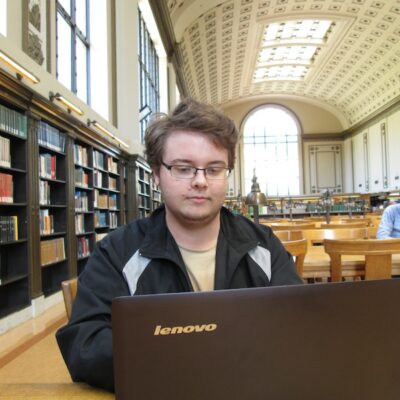Ayden Parish Humanities
Conceptual Metaphors in Describing Transgender Identities
Ayden is exploring the metaphors used to describe transgender identities and experiences. Cognitive linguistics understands metaphor as central to language and human cognition, allowing us to grasp abstract concepts via physical sensations and everyday experiences. There has, however, been very little put forward for a cognitive linguistics of gender: How are the meanings of gender expressed and perceived? What are the effects of particular linguistic structures on how gender is thought about and performed? How are identities in general rendered meaningful? Ayden will collect data from public sources such as newspaper articles and analyze their underlying structures and assumptions, as well as how they impact the real lived experiences of transgender individuals.
Scholars Journal
I find it difficult to clearly differentiate between research and not-research. Both my week at the International Cognitive Linguistics Conference and the day of San Francisco Pride can be considers aspects of my overall project. I idly slip into thinking about my research at almost any momentits inevitable, really, when dealing with a topic so central to society and my own identity as gender. With the Haas Scholarship, however, I was able to do more than muse idly about the language describing transgender individuals; I was able to collect data from a wide range of sources and compare them to theories in the various books I read. Ill enter Fall semester already able to begin sketching an outline for my thesis. My summer began with a flight to Edmonton, Canada for the International Cognitive Linguistics Conference. Last year, my mentor Eve Sweetser suggested that I submit a term essay to be presenteda short paper analyzing how many phrases related to transgender people utilize a mind-body dichotomy. This same paper would inspire my current research project. I was elated, amazed, and somewhat anxious when my submission was accepted. Upon arriving at the conference, though, I realized my anxiety was baseless. I was not, as I worried, clearly out of my league and lost in a crowd of graduates and professors. I was treated as an equal; in fact, some UC Berkeley graduate students claimed to forget I was an undergraduate at all. The simple act of preparing my presentation honed my understanding of the topic, but being able to receive feedback and suggestions was irreplaceable. The conference also made me consider much broader questions about the political implications of my methodological preferences, as well as my future role in the discipline of cognitive linguistics. After the conference came the main segment of my summer research. This was a relatively unorganized (but certainly not disorganized) combination of scouring public materials for linguistically interesting descriptions of transgender identities and reading theory-heavy books and articles. Depending on the day, I would look through newspaper articles, a myriad of LGBTQ-focused educational websites, andwhen I felt up for itanti-transgender diatribes. I archived entire pages using digital software, so that I could later highlight the most illuminating examples. When I wasnt searching for data, I was reading texts from both queer studies and cognitive linguistics. There are many books, like Judith Butlers Gender Trouble or George Lakoff and Mark Johnsons Philosophy in the Flesh, which serve as important cornerstones for their respective fields, but which I never had the opportunity to read in full. It is certainly less stressful to do my necessary reading over the summer than to try to cram even more reading into a schedule full of lectures and homework. What surprised me the most is how social of an activity research has been. Compared to those conducting interviews or those working with others in labs, I thought I would be the very image of the lonesome academic with their nose in their books; however, I found others more than eager to talk to me about their take on my research project. A number of acquaintances are constantly on the lookout for mentions of transgender individuals in news articles, and I have had in-depth conversations with non-academic transgender friends about the problems with current research about transgender people. While the majority of my time is still spent thinking thoughts to myself, I certainly appreciate those moments like at the San Francisco Pride, talking to my parents about the various ways people mix and match pronouns when telling narratives about transgender peoples lives. With how pervasive my research topic is, I really cant quantify how much progress I made over the summer. All I can say is that I believe I now have a more nuanced, deliberate, and holistic understanding of my research, both as a specific instance of analysis of how transgender individuals are described metaphorically, and as a small piece of a complex system of disciplines and human beings. I hope to, bit by bit, help fellow transgender people gain more of a voice in this system. Im eager to get to work on my thesis, which will be just the first step in my academic career.